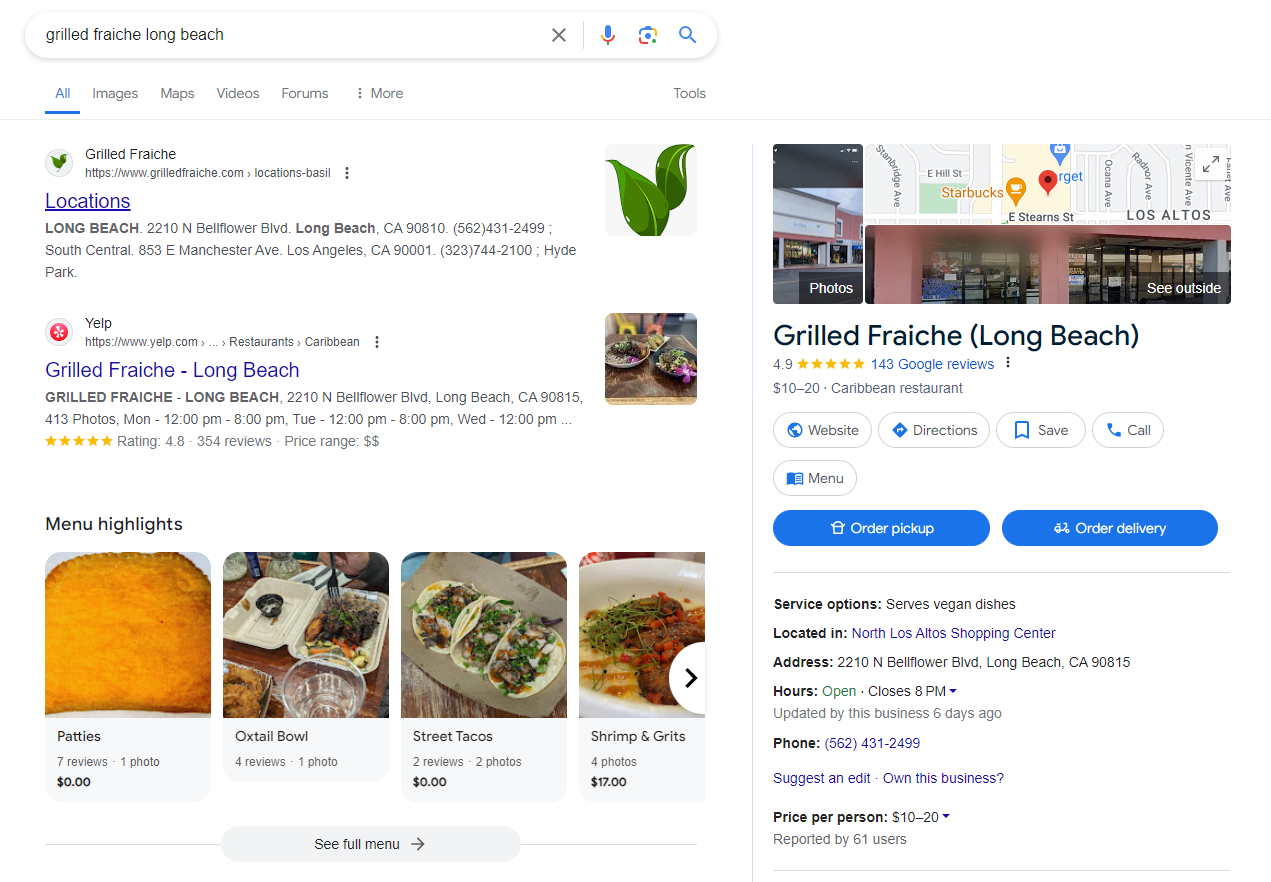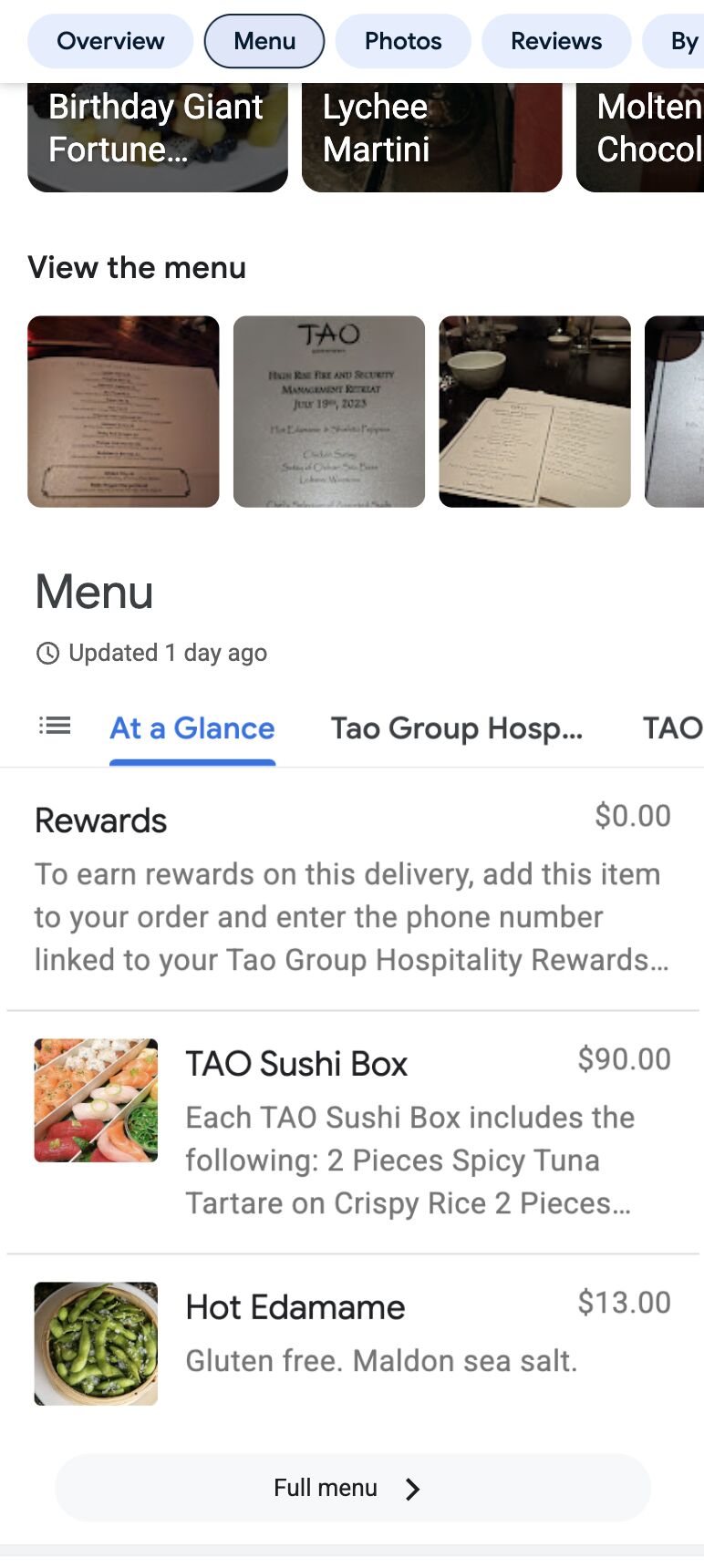Generative Engine Optimization (GEO): Mastering AI-Driven Search in 2025
Local Memo: What the Google Leak Means for Local Search
Local Memo: What the Google Leak Means for Local Search
In this week’s update, learn what the Google leak means for local search; why AI Overviews have dropped in volume; how Google is highlighting restaurant menus and handicapped accessibility; and why mobile is the starting point for SEO.
What the Google Leak Means for Local Search
The News
David Mihm makes several useful points in a post this week about the leaked Google documents, first shared by Rand Fishkin, that took the SEO world by storm last week and will likely be a point of discussion for some time to come.
Mihm’s focus is the leak’s implications for local search, but first, he shares his opinion about the leak’s nature in general, saying that it seems to contain many interesting clues about elements of Google’s search algorithm without offering definitive evidence for how that algorithm works. However, Mihm suggests we can use the documents to help inform our SEO understanding and strategy.
Here are a few strategic takeaways:
- Google appears to use clickstream data to determine local relevance, and this may include clicks on Google Business Profiles (GBPs) in addition to websites.
- The importance of sitewide signals (similar to the Moz concept of Domain Authority) suggests that overall site architecture has a greater impact than previously acknowledged on the ranking of individual pages, including local pages.
- Google appears to be looking for and correlating references to entities from multiple sources, including onsite content and even YouTube video transcripts. Remember, entities are concepts related to Google’s Knowledge Graph, which includes local businesses.
- Google apparently maintains a list of “salient terms” related to local queries that help to determine their intent; though the documents don’t reveal those terms directly, they contain several clues about how Google routes local queries based on intent signals and categorization of entities.
- The documents repeatedly refer to a special set of criteria for evaluating chains (i.e., multi-location businesses). Google seems to put a lot of effort into determining whether queries and web content relate to chains, which are treated differently from other local businesses.
- There are hints that Google considers the authority of a Google Business Profile when ranking a website and vice versa. There also appears to be a specific classification for local directory sites.
What This Means
It’s a lot, but the findings mainly reinforce the importance of building authority around entities; in other words, making sure that your online representations (web pages and online profiles) contain lots of useful information that is relevant to consumers who have needs you can fill.
AI Overviews Drop in Volume
The News
It seems clear that Google has responded to the controversy around bad AI Overview results by scaling back the rate at which they appear. Even upon launch, according to a new report from BrightEdge, AI Overviews (AIO) were far less frequent than AI “snapshots” in Search Generative Experience (SGE), the experimental iteration of AIO.
SGE showed AI-generated results for 84% of queries, whereas AIO results now appear only 15% of the time. (AIO results were also found to be 195% more likely in results with a featured snippet.)
In light of the controversy since I/O, Google announced last Thursday that it was adding “triggering restrictions for queries where AI Overviews were not proving to be as helpful” and adding more safeguards. Now Mark Traphagen of seoClarity is reporting that AIO volume has reduced significantly in the last several days, now appearing only 3% of the time, though the rate varies by query type.
What This Means
It’s likely that the reduction in volume for AIO is temporary. In Google’s announcement, the company states that releasing AIO to a much larger user base has resulted in a lot of new feedback that is now being assessed to improve the system. But unless it’s rolled back completely — very unlikely given the competition in AI that Google is trying to respond to — this important new search feature will grow in prominence and, hopefully, usefulness over time.
Menu Highlights and a Freshness Indicator Appearing in SERPs
The News
Google will now surface menu highlights in search results, pulled from business profiles but independent of standard local results. The feature appears as a carousel of menu items with photos, details, and prices, and is triggered by a search for the restaurant where a full business profile (aka knowledge panel) also appears, and perhaps in other contexts.
The queries we’ve seen surfacing in this result do not necessarily contain terms relevant to the menu items; Google is showing this content to provide users with further information about a restaurant they’ve already searched for.

Also, in restaurant menu news, Google has announced that it will display a freshness indicator that shows how recently a menu has been updated. “Thanks to this update,” the announcement reads, “users now see if a restaurant’s menu has been updated in GBP within the past 2 months.”

Freshness indicator in restaurant menu, courtesy of Google
What This Means
Depth of optimization is an important theme for all businesses, and as AI becomes part of the search experience, rich details will become even more important. For restaurants, this means providing detailed menu content in Google profiles so as not to miss the opportunity to stand out in results like these — and keeping that menu up to date.
Wheelchair Accessible Icon Showing in GBP Results
The News
A wheelchair-accessible icon now appears in Google profiles for businesses that have enabled the relevant attribute. Though the attribute is not new, the new icon makes it more prominent in search results. The icon is currently appearing in Google Maps results only.
![]()
What This Means
Accessibility attributes are a ranking factor, in the limited sense that if you search for “wheelchair accessible restaurants,” for example, the listings that have the wheelchair accessible attribute enabled will show first. We’ve tested and confirmed this. So if you offer wheelchair accessibility, be sure to indicate this in your Google profiles.
Google Index Goes All-Mobile on July 5
The News
Google has announced that websites that don’t work on mobile devices will no longer be indexed after July 5. The company began the transition to mobile-first indexing way back in 2016, but this is the final nail in the coffin for any remaining sites that are not accessible on mobile devices.
What This Means
It’s important to remember that mobile is the primary means by which Google understands your site today. For some things, like the quality or relevance of content, the difference between desktop and mobile experiences is nominal, but to the extent UX influences your site’s performance, remember to think of the mobile experience first. However, this update does not make mobile-friendliness any more or less important than it already was.




